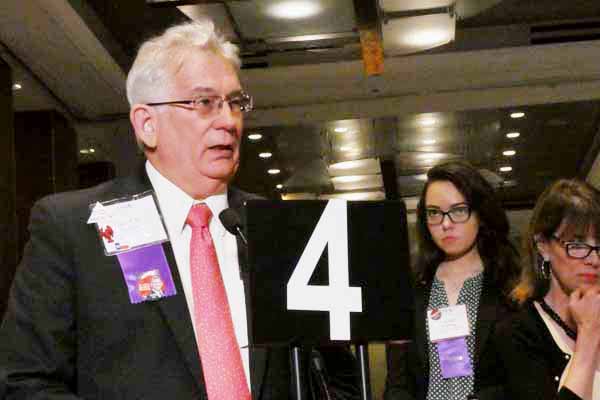
CHICAGO — Leaders of the Texas Medical Association on Tuesday publicly objected to the American Medical Association’s plans to get involved in a high-profile federal lawsuit — filed in Texas — challenging the constitutionality of the Affordable Care Act (ACA).
“We fervently urge the AMA not to file a brief in this case at this time,” David Henkes, MD, chair of the Texas Delegation to the AMA House of Delegates (Above), said on the floor of the house Tuesday afternoon.
“The ACA is an extremely unpopular political symbol in our state,” he said. “Should the AMA file a brief in this case, I have no doubt it will interfere with our work on key state issues such as liability reform, scope of practice, insurance reform, Medicaid, public health, and graduate medical education.”
Dr. Henkes’ remarks came after AMA Board of Trustees Chair Gerald Harmon, MD, acknowledged the veracity of rumors that had circulated for days around the AMA’s 2018 annual meeting here: AMA does indeed plan to file a friend-of-the-court brief in Texas v. United States. And AMA plans to file that brief in opposition to the position taken by Texas Attorney General Ken Paxton, who filed the suit against the ACA in federal district court in Fort Worth.
“This amicus brief continues our long-time advocacy to achieve coverage for the uninsured as well as insurance market reforms that are important to patients and physicians,” Dr. Harmon told the AMA house. “If the plaintiffs were successful, federal policy would roll back to 2009 without any substitute in place.”
Reforms at risk, he said, include protections for patients with preexisting conditions, minimum medical loss ratios for insurers, and 100-percent coverage for certain preventive services.
TMA opposed final passage of the ACA in 2010, and TMA’s “fix what’s broken, keep what’s good” policy is more nuanced than the AMA’s, said TMA President Douglas Curran, MD
“We like, and we want to keep, those parts of the ACA that are good for our patients, like guaranteed coverage for people with preexisting conditions,” Dr. Curran said. “Other parts, like the disruption of insurance markets and overwhelming paperwork burdens on physicians, have to go.”
Nineteen other states joined Mr. Paxton in seeking to overturn the ACA. Seventeen other states have asked to intervene on the other side. The lawsuit is based on the constitutionality of the ACA, particularly the provision requiring most Americans to carry health insurance, not on the merits of the ACA. The case attracted considerable attention last week when the Trump Administration announced it will not defend those provisions of the law in court.